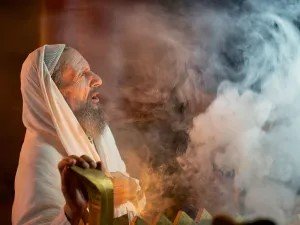Philippians 3:13b-14; Isaiah 43:18-19a
In case you didn’t catch that, “Usta done died!” The way things used to be isn’t any more. We are now living in the present, and the past no longer exists. That is something that is hard to accept in these days of pandemic. As Kay Kotan writes in her book, Being the Church in a Post-Pandemic World, “Since March 2020, when our lives were turned inside out, many have craved returning to the ways things once were. We continually heard comments like, ‘I can’t wait to get back to normal!’ … Reality check: Life will never be the same. The world, and therefore our lives, have changed forever. There is no going back. Our new reality is yet to be determined. The effects will take some time to settle in. Adjustments will continue to have a ripple effect for years to come.”
For those who were comfortable with the way things were before March 2020, this is not good news. And for those who were comfortable with the way the church was before March 2020, this is not good news either. But we can no longer do things the way we used to do them. “Usta done died.” The church as we knew it before the pandemic started doesn’t exist anymore. Right now we are in a kind of in-between time, and we don’t really know what the church of the future will look like. We just know that it will be different. And if we’re honest, we know that it needs to be different. It needed to be different before the pandemic started. Because the church before the pandemic wasn’t working anymore.
Most churches were in a decline before March 2020, and had been for years. Ours was no different. If you look at membership, attendance and giving, you will see basically a slow but steady drop in numbers over the past 20 years or so. Kotan writes, “The pandemic certainly didn’t cause the decline of the church, but it made the decline more obvious and accelerated the decline for those that were already struggling. Therefore, the pandemic has created a sense of urgency for some churches …” In fact, some churches have been forced to close as a result of the pandemic; they just could not survive. I would include both Lake Sunapee and Grantham as churches that have reached a point of urgency about them. And, to be blunt, some changes, perhaps drastic changes, are going to be needed if we are to survive into the future. As one of my former Church Council chairpersons used to put at the top of every meeting agenda, “If nothing changes, nothing changes.” And the pandemic, this horrific crisis, has created an opportunity for us to make some necessary changes in order to move our churches forward.
We should not allow ourselves to become frightened at the prospect of making changes. Everything changes sooner or later. There have been changes made in this church before now, some good and some not so good, some successful and others less so. Change is a sign of life. Thom S. Rainer writes in The Post-Quarantine Church, “Be excited and encouraged. Don’t let the unknown become a source of fear. You are not entering this new era alone. Not only is God with you; he has gone before you.” Bishop Bruce R. Ough, who is the Executive Secretary of the Council of Bishops, writes, “What I observe among us, and what I certainly have racing around in my soul, is both lament and rejoicing. I lament that there will be no return to normal; … Yet, I rejoice in the opportunity to re-envision, re-create, re-invent, re-imagine our congregations.”
So if we can’t be what we used to be any longer, if we need to re-invent what we do and how we do it, where do we start?
We start with prayer, and lots of it! When the early followers of Jesus were waiting in Jerusalem for the coming of the Holy Spirit, they spent their time in prayer together. And after the Holy Spirit came, they also devoted themselves to corporate prayer. Our district superintendent challenged the Grantham church in particular to spend time in prayer this year. But I believe it is necessary for both churches. We must make prayer a high priority. We must pray for discernment. We must pray for ears to hear what God would say to us. We must pray for ears to listen to what our community asks of us. We must pray for the willingness to be flexible and open to the leadership of the Holy Spirit. And then we wait. We wait until God answers our prayers. Sometimes it takes a while to get those answers. And waiting can be hard for some of us who are not naturally patient. But waiting doesn’t mean doing nothing.
Second, while we wait, we connect with the people around us. We ask the people in our community what they need from us. We ask them how we can be of service. We look for ways to partner with other organizations in the community, such as the schools. We get creative about ways to invite people into our building, and we work to remove obstacles in using our facilities for community activities. We build relationships with our neighbors. And we look at our building as a tool for reaching our community.
Third, we develop a vision for our church. A vision is different from a mission. Our mission is our reason for existence, and, as stated by the United Methodist Book of Discipline, is to make disciples of Jesus Christ for the transformation of the world. Our vision is something different. Our vision is how we live into that mission in our unique context. I am in my second year of a three-year program called Creating a Culture of Renewal. I am in the process of selecting a Vision Team, people who will help me create a vision for our church. And once we have that vision, we will lay plans for implementing it over the following year. This vision will certainly take into account the ways that the world has changed since March of 2020. And it will remember that “usta done died.”
Bishop Laurie Haller of the Iowa Conference said, “The current disruption is actually a gift that will lead churches into new possibilities …, thus transforming their communities and the world.” We have to remember that God is in the business of making things new, of re-creating. God is not content to just leave things as they are, or to leave people as they are. Think how many characters in the Bible underwent incredible changes in their lives as God used them for his purposes. And think about how the world was changed through those who served God.
Kay Kotan writes near the end of her book:
The post-pandemic church must be different than what it was prior to 2020. To lead the church forward, leaders can’t be frozen in a pre-pandemic world. The future church and its leaders will need to be flexible, relational, visionary, spiritually grounded, highly committed, innovative, resilient, and courageous. These were likely not the practices most churches regularly practiced or valued prior to the pandemic …
But friends, please hear me. For us Christ followers, trying to do our part in living out the Great Commission and the Great Commandment, we must release what we have previously been and done. It no longer works. We must do better. We must be better. We must begin to re-imagine what it means to be the church.
The pandemic was a horrific, historical, and devastating long-term occurrence. It will take years, possibly decades, to discover the totality of the ripple effects of this pandemic. Yet conversely, this sudden disruption of life as we once knew it has given the church a wonderful, unprecedented opportunity to re-think, re-imagine, and reinvent the church.
While it is true that “usta done died,” we don’t know what will be yet. I, for one, am excited by the possibilities before us. People are looking for something different from the church. And that means that the church must be and do something different. Don’t be afraid of the change. Embrace it. And know that the God who makes all things new is working with us to make this church ready for the post-pandemic world.

























